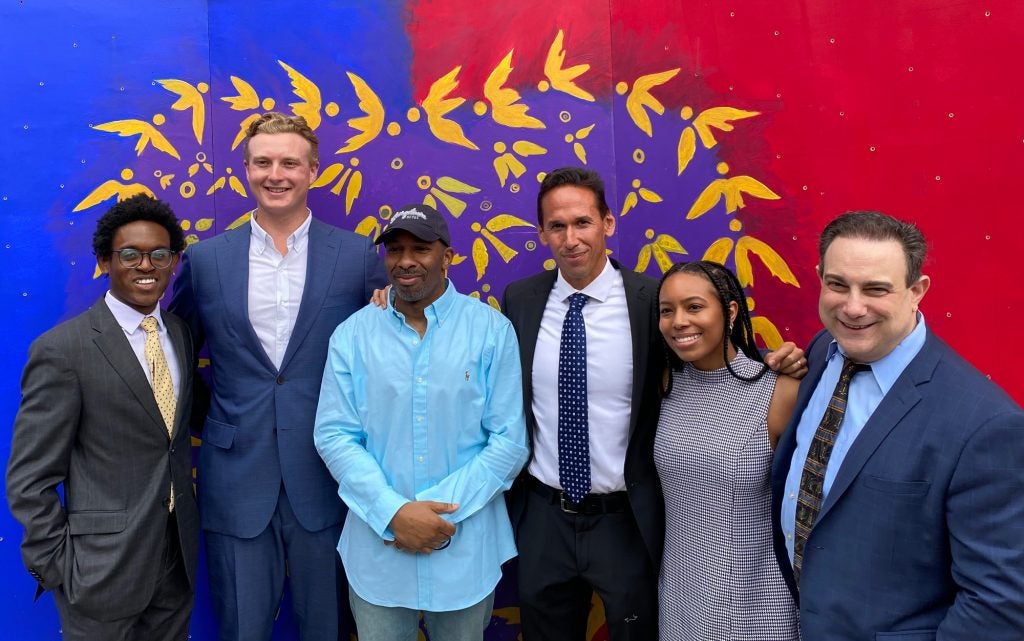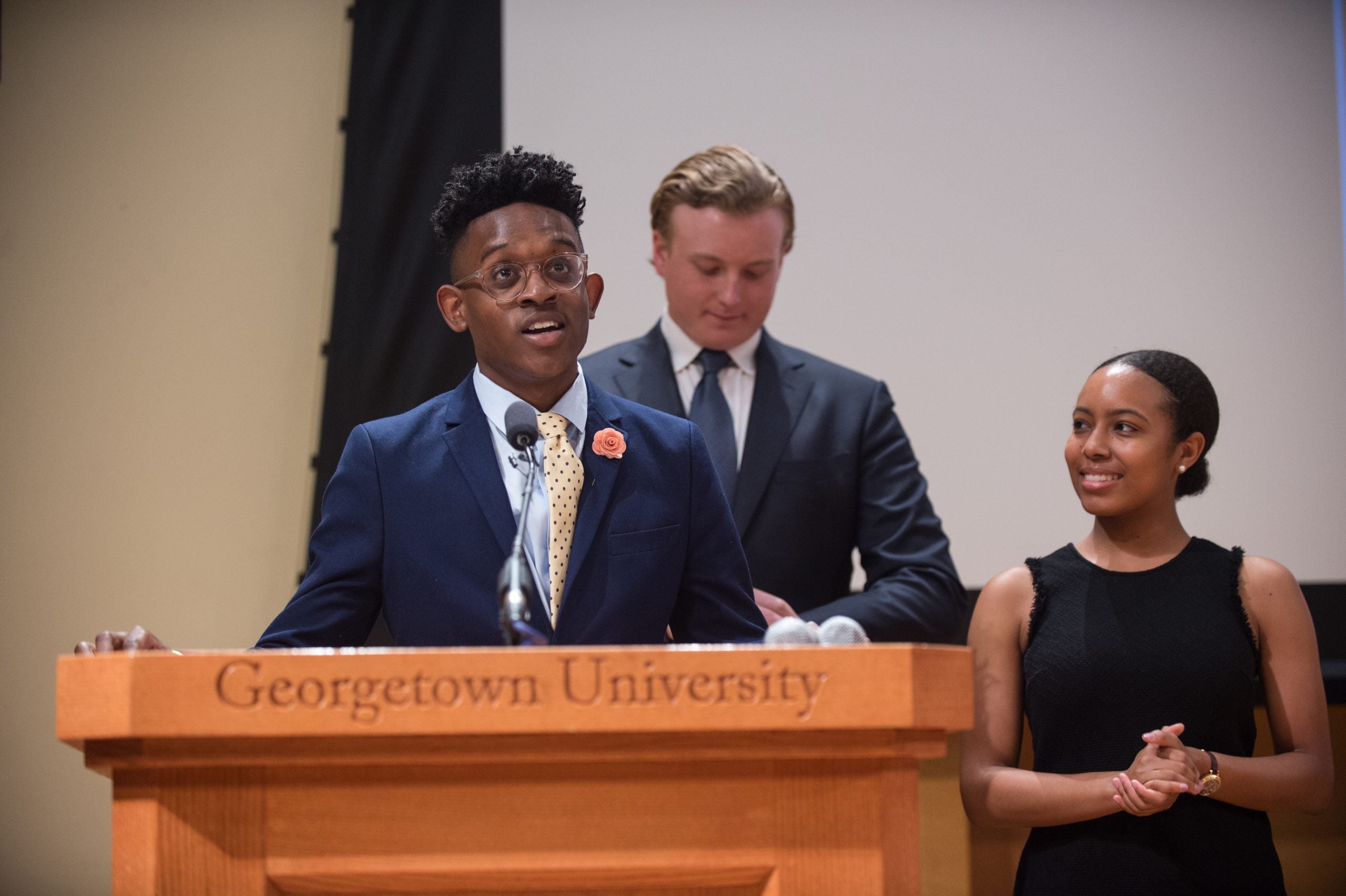Alumnus Accepted to Inaugural Cohort That Will Train Next Generation of Civil Rights Lawyers
Kendell Long (C’19) was chosen as part of the Legal Defense and Educational Fund’s (LDF) inaugural 10-person cohort of the Marshall-Motley Scholars Program (MMSP). Launched in January of this year, the groundbreaking initiative seeks to provide training, scholarships and career support to the next generation of civil rights lawyers in the South.
“I am daringly imaginative about the potential of what the South could be for Black people,” Long says. “After high school, I was initially determined to leave, but my time away has deepened my appreciation and increased my desire to contribute to make the South a place where Black people can be whole despite the painful history of racism.”
Long, Lawyers, Liberation
Long has been a lifelong advocate for Black liberation. Originally from Dallas, Texas, Long grew up in a state with one of the highest incarceration rates in the country, which inspired his interest in criminal justice.
After coming to Georgetown University, Long declared a dual major in government and African American Studies. which helped to further his understanding of the inequities in our society.
LaMonda Horton-Stallings, chair of African American Studies, says that a major in African American Studies can “challenge students to see how intersectionality and decolonization inform equality and social justice so as to transform society.”
“From there, students are prepared to carry out their own vision of how to challenge structural and cultural causes of inequality,” she explains.

His coursework and prior passion for social justice led Long to enroll in “Ethics of Incarceration” through the Prison and Justice Initiative (PJI) on campus. This course inspired him to apply to “Making an Exoneree” for which he was selected to advocate for Eric Riddick who was wrongly convicted of murder.
Long and his classmates reinvestigated the facts of the case from nearly 30 years ago, poured over files and presented them before the Philadelphia’s District Attorney’s Office Conviction Integrity Unit. After garnering over half a million online supporters, Riddick was released in May of this year.
“My work with the Making an Exoneree Project prompted me to pursue my role as a paralegal at the Washington Lawyers’ Committee for Civil Rights and Urban Affairs, a civil rights impact litigation organization serving Washington, DC, Maryland and Virginia, where I supported our work to reform the criminal legal system and enforce fair housing,” Long says.
Through his experiences advocating for incarcerated individuals and his academic work, Long decided to pursue a law degree and so applied to MMSP.
About the Marshall-Motley Scholars Program
The Marshall-Motley Scholars Program is named in honor of Supreme Court justice, legendary civil rights attorney and LDF founder Thurgood Marshall as well as iconic civil rights litigator and the first Black woman to serve as a federal judge, Constance Baker Motley. The support offered by the MMSP is an intentional effort to address the racial and economic barriers that often deter students from pursuing their dreams of becoming civil rights attorneys, and a targeted effort to support the civil rights ecosystem in the South.
Over the next five years, each cohort of MMSP scholars will be afforded a full law school scholarship for tuition, room and board and incidentals to alleviate the debt burden that can prevent future lawyers from pursuing a career as a civil rights attorney. Recipients will also receive support getting summer internships focused on racial justice to jumpstart training in civil rights law at national and regional civil rights organizations with offices in the South, as well as a two-year postgraduate fellowship at civil rights law organizations in the South fighting to achieve racial justice.
Finally, Long and other awardees will have access to special trainings sponsored by LDF and the National Academy of Sciences. After completing their degrees, scholars pledge to devote the first eight years of their career to practicing civil rights law in service of Black communities in the South. Long currently plans to attend Northwestern Pritzker School of Law this fall.
Marc Howard, director of the Prison and Justice Initiative, says that “Despite his calm and thoughtful demeanor, Kendell Long is a ferocious force for justice.”
“I have deep respect for his dedication to making the American legal system more fair and humane, and I look forward to seeing him thrive in law school and beyond,” he continues.
An Active Advocate
Alongside his work for the Prisons and Justice Initiative, Long held many leadership positions in Georgetown’s local chapter of the NAACP, including co-president and co-vice president. He also worked with the Georgetown 272 Advocacy Team to mobilize Georgetown’s undergraduate student body to vote and urge administrators to implement the creation of a fund to provide financial compensation to communities descending from those sold and enslaved by Georgetown.
As a member of the Black Theatre Ensemble, Long co-wrote and -directed a play entitled The Hand That Feeds You, based on reflections of activism and Black identity at Predominately White Institutions (PWIs) like Georgetown. The alumnus was also a co-chair and facilitator for Leaders in Education About Diversity.
Long’s commitment to racial justice stems from the belief that his existence is tied to his community. He believes that the frontier of criminal justice reform is exploring the ways emerging technology, such as artificial intelligence and machine learning, can further racial inequity in the criminal legal system.
“Practicing the law was a career that I did not see as accessible to me, let alone a career that could positively affect my community’s material reality,” Long says. “I am eager to affirmatively contribute to relieving conditions and structural racism today while creating a better future for coming generations. Wielding the law alongside advocacy at the grassroots level, legislatures and cultural spaces will allow me to do that.”
-by Shelby Roller (G’19)
